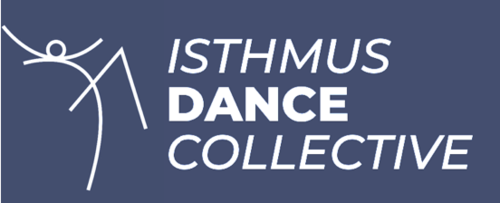Mission Statement
“Isthmus Dance Collective (IDC) aims to provide greater access to dance opportunities on the individual, inter-organizational, and community levels in ways that are sustainable for the artists and high impact for the arts community in the Madison area and beyond. Members of IDC work cooperatively in a non-hierarchical manner to provide accessible and inclusive dance education and outreach, performances, and to promote dance dialogue in the community.”
The IDC Model
The Isthmus Dance Collective is a cooperatively organized non-profit corporation. Our collective is modeled on a hybrid of several types of cooperative or collective organizational structures, primarily a consumer and a worker cooperative. IDC members contribute to the operations of the organization, monetarily and through service work.The pooling of our resources allows us to provide our member artists with better access to rehearsal space, physical training, continued education, music, insurance, and more. It also creates a space for dance artists in our community to exchange ideas, learn from each other, and push the art of dance to develop in ways that serve the betterment of ourselves, the community, and the world.
As a democratically-run collective, all of our members have an equal say and an equal vote. We are dedicated to listening and to a mindset for continually re-evaluating whether all of our members are being seen and heard. This micro-culture is an important part of our decision-making, our commitment to diversity, and our desire to collaborate.
Statement on Diversity and Equity
The Isthmus Dance Collective recognizes that there is a lack of diversity and equity in the dance world. While we don't have all the answers, we are committed to increased diversity within IDC and throughout the dance community. We welcome and encourage new members from all races, ethnicities, ages, gender identities and sexual orientations. We also recognize that this is not sufficient and that opening our doors to all does not automatically make our membership more diverse. As part of our efforts, IDC commits to
Actively reach out and engage under-represented groups.
Develop and support content that amplifies marginalized voices and promotes awareness of the vast cultural legacy that they bring forth.
Engage in open and safe discussions.
Seek guidance from experts and leaders from social organizations that promote equity.
Continually evaluate our approach and explore new ideas and input from the community in order to achieve these goals.
IDC members believe in advancing a culture of social equity with opportunities for open and safe discussions to ensure a safe and inclusive atmosphere in the dance community.
IDC members are committed to building and promoting an antiracist and anti-discriminatory community through active introspection and self-awareness.
IDC condemns all forms of racism and discrimination.
Land Acknowledgement
As members of the Isthmus Dance Collective, we recognize that we live, work, and dance on stolen Native land. We recognize and respect Indigenous Peoples as traditional stewards of this land and the enduring relationship that exists between Indigenous Peoples and their traditional territories. We acknowledge the original inhabitants and caretakers of this land: Primarily the Ho-Chunk, as well as the Očhéthi Šakówiŋ, Myaamia, Sauk, Meskwaki, Peoria, and Kiikaapoi people who were forcibly removed from the region.
“To recognize the land is an expression of gratitude and appreciation to those whose territory you reside on, and a way of honouring the Indigenous people who have been living and working on the land from time immemorial. It is important to understand the long standing history that has brought you to reside on the land, and to seek to understand your place within that history. Land acknowledgements do not exist in a past tense, or historical context: colonialism is a current ongoing process, and we need to build our mindfulness of our present participation. It is also worth noting that acknowledging the land is Indigenous protocol.”
–http://www.lspirg.org/knowtheland
You can read more about land acknowledgement and find out what land you occupy on https://native-land.ca

